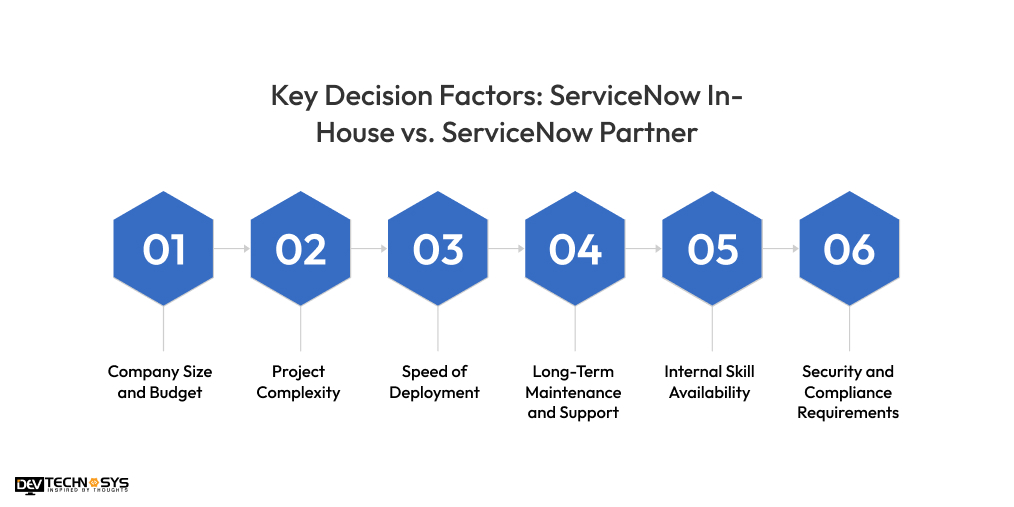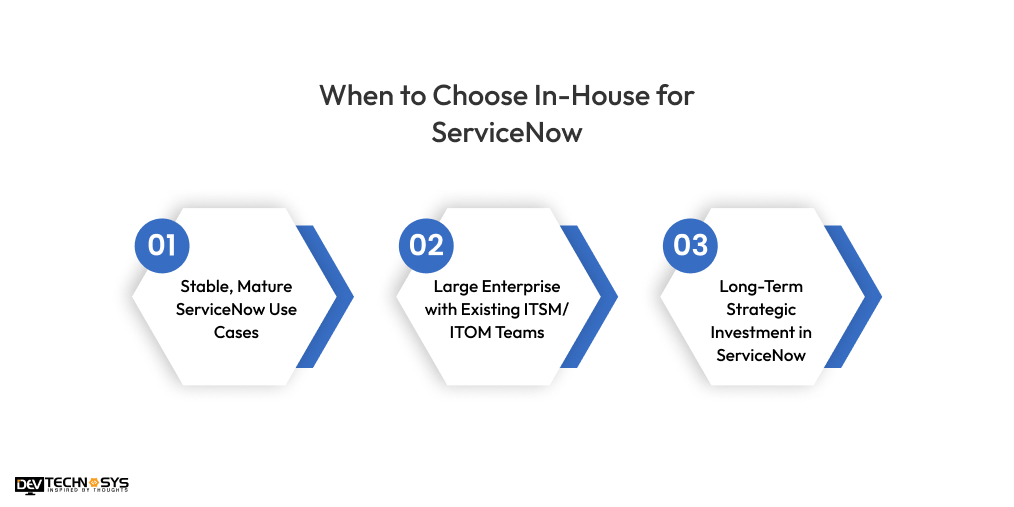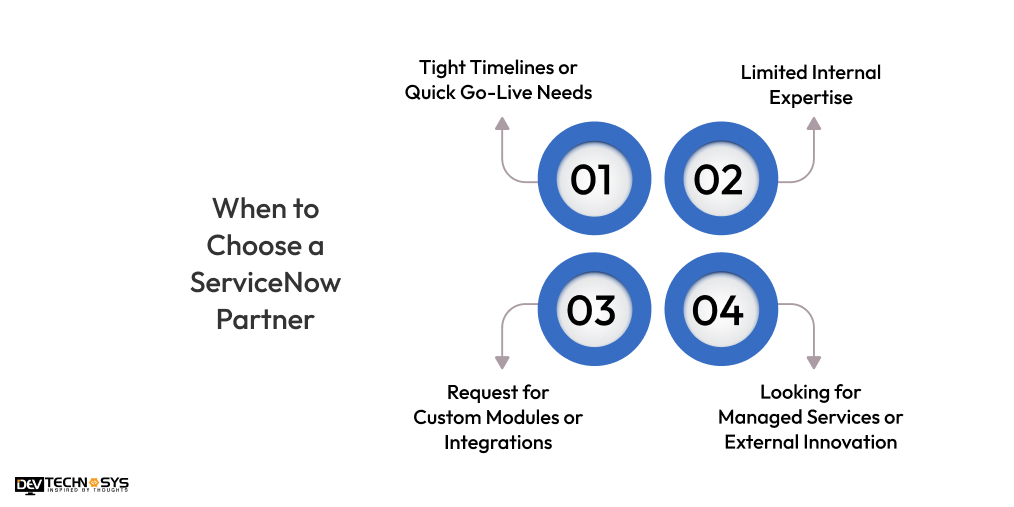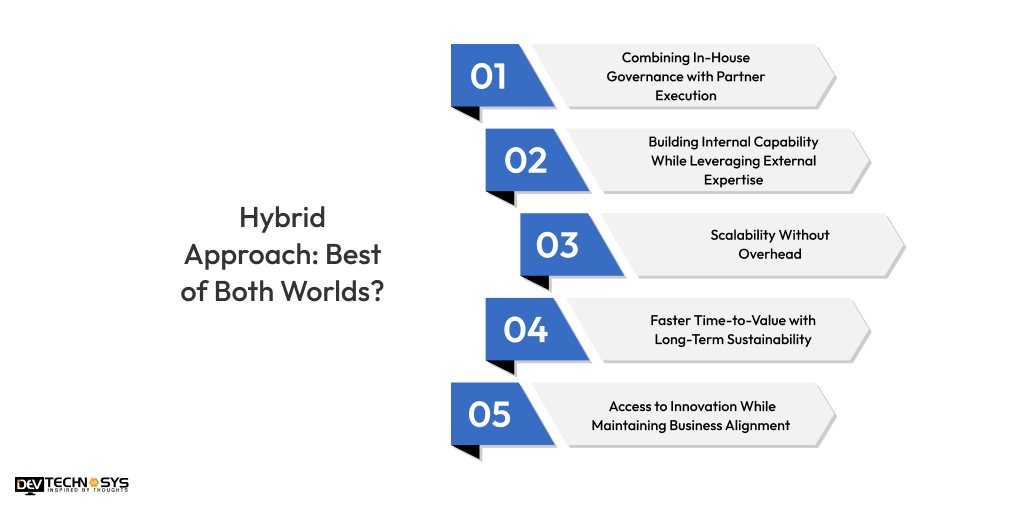Nowadays, ServiceNow is one of the most popular solutions to make it easy for businesses to handle their operations easily and offer efficiency and flexibility. But businesses are confused about choosing ServiceNow in-house or a ServiceNow partner.
Simply, it depends on the specific requirements and demands of businesses; no need to go anywhere to get an idea of which partner is better for your business.
In a recent study, ServiceNow announced acquisitions to expand their platform capabilities and reported a Q1 2025 earnings beat and raised its outlook.
With the help of this, we discover that ServiceNow is increasing day by day and expanding partnerships with other popular enterprise, such as NVIDIA.
In this blog, we will explore ServiceNow In-House vs. ServiceNow Partner and which is better for businesses.
Let’s start!
What is ServiceNow In-House?
An In-House ServiceNow Team is a committed group of personnel within a business who manage all parts of the ServiceNow platform. This team is responsible for implementation, development, customization, and ongoing support that is tailored to the company’s specific requirements.
Building an in-house team gives you more control, deeper system knowledge, and alignment with internal processes, but it also involves a major commitment in talents and resources.
Responsibilities of an In-House ServiceNow Team
- Manage and maintain the ServiceNow platform’s health and performance
- Administer user roles, permissions, and system configurations
- Gather business requirements and design tailored workflows
- Develop and customize applications, forms, and automation scripts
- Integrate ServiceNow with internal and third-party systems
- Provide ongoing support and troubleshoot platform issues
- Monitor and improve IT and business process efficiency
What is a ServiceNow Partner?
A ServiceNow Partner is a certified third-party company that assists businesses in implementing, optimizing, and managing ServiceNow systems. These partners provide specialized knowledge, tools, and resources to help accelerate deployments, ensure best practices, and build a custom service catalog in ServiceNow.
They cover everything from the initial setup to continuous maintenance, making them suitable for businesses that lack in-house knowledge or require scalable ServiceNow capabilities.
Responsibilities of a ServiceNow Partner
- Assess business needs and recommend appropriate ServiceNow solutions
- Design and implement customized workflows, applications, and modules
- Configure and deploy the ServiceNow platform across departments
- Integrate ServiceNow with third-party and legacy systems
- Provide project management and governance throughout implementation
- Offer technical support, maintenance, and platform optimization
- Ensure compliance with industry standards and ServiceNow best practices
ServiceNow In-House vs. ServiceNow Partner: Which Is Better?
Here’s a comparison table outlining the key differences between ServiceNow In-House vs. ServiceNow Partner, highlighting ServiceNow partner and in-house ServiceNow team pros and cons, and suitability for different business needs.
| Criteria | ServiceNow In-House | ServiceNow Partner |
| Control | Full control over customization, implementation, and maintenance. | Less control over day-to-day operations and decision-making.
|
| Cost | High initial cost for hiring, training, and maintaining staff. | Higher short-term costs for consulting, implementation, and support.
|
| Expertise | Requires continuous investment in training and skill development. | Immediate access to specialized expertise and best practices. |
| Scalability | Can face limitations in handling large-scale projects or rapid growth. | Highly scalable with additional resources available as needed. |
| Implementation Speed | Slower setup due to internal learning curves and resource availability. | Faster deployment thanks to experienced consultants and pre-built solutions. |
| Customization & Flexibility | Highly flexible, tailored to internal needs and specific business processes. | Offers customization but may not be as flexible as in-house teams. |
| Long-Term Maintenance | Long-term, cost-effective if the team is well-maintained. | Long-term reliance on external vendors, potentially costly. |
| Knowledge of Internal Culture | Deep understanding of company culture and processes. | May struggle with aligning fully with internal processes and culture. |
| Support & Issue Resolution | In-house teams handle immediate issues but may face skill gaps. | Partners offer dedicated support with faster issue resolution. |
| Risk of Turnover | Risk of knowledge loss if key employees leave. | Lower risk of turnover, as external partners maintain their own teams. |
| Compliance & Governance | Easier to align with internal compliance and governance policies. | Partners may need more oversight to ensure alignment with internal standards. |
| Training & Knowledge Transfer | Requires continuous internal training efforts. | Partners typically provide training and knowledge transfer during engagement. |
Key Decision Factors: ServiceNow In-House vs. ServiceNow Partner
Important considerations when deciding between a ServiceNow partner vs in-house team: To choose the best option for your business, consider factors such as company size, budget, project complexity, deployment speed, long-term support, internal skill availability, and security and compliance requirements.

1. Company Size and Budget
For large enterprises with significant resources, an in-house team provides complete control, deep integration, and long-term cost savings. Small to medium-sized organizations, on the other hand, may find ServiceNow certified partners to be less expensive.
Servicenow consulting services remove the need for major upfront investment in hiring ServiceNow partner, training, and technology, allowing smaller businesses to deploy solutions without incurring the high financial costs involved with forming an internal team.
2. Project Complexity
For more complicated or bespoke projects, an in-house team can provide specialized solutions that are linked with specific business procedures and objectives. In-house personnel are experienced with internal operations and can handle sophisticated customizations.
However, Servicenow implementation services bring specific skills and experience to manage complicated projects swiftly and efficiently, lowering the risk of misalignment and ensuring best practices are followed for sophisticated features or connections.
3. Speed of Deployment
ServiceNow consulting partner advantages delivering rapid deployments because of their pre-built tools, templates, and knowledge, resulting in a faster time-to-value. They excel at meeting tight deadlines and managing resources efficiently.
In contrast, in-house teams may experience delays as they complete training, create resources, and adjust to the platform. The learning curve might slow down deployment, making it less suitable for enterprises that require rapid installation.
4. Long-Term Maintenance and Support
With an in-house team, long-term maintenance is directly controlled, ensuring that solutions are in sync with changing company requirements. However, maintaining this demands continuous investment in resources and experience.
Servicenow support services provide ongoing support and managed services to keep the platform updated, secure, and optimized.
5. Internal Skill Availability
An in-house team requires qualified individuals, such as developers, administrators, and business analysts, to design and administer the platform. If internal resources lack ServiceNow knowledge, hiring or training becomes necessary.
ServiceNow partners, on the other hand, offer immediate access to a pool of trained people with specific knowledge, guaranteeing that expertise is available for both deployment and long-term management, eliminating the need for internal recruitment.
6. Security and Compliance Requirements
In-house teams are great for managing and controlling rigorous security and compliance regulations. Organizations with particular security policies benefit from having an in-house team that can assure quick compliance with internal governance.
Servicenow migration services offer industry-standard security measures and have extensive experience managing compliance, particularly for enterprises that must adhere to a variety of industry laws.
When to Choose In-House for ServiceNow
When to Select In-House for ServiceNow: Ideal for businesses with consistent use cases, major enterprises with existing ITSM/ITOM teams, or those making a long-term strategic investment in Servicenow managed services that necessitates complete control, customization, and ongoing alignment with business objectives.

1. Stable, Mature ServiceNow Use Cases
If your company currently has a solid ServiceNow deployment with established procedures, an in-house staff can offer long-term support and continual in-house ServiceNow development. In-house teams may concentrate on optimizing existing operations, managing incremental adjustments, and maintaining a consistent platform that matches with business requirements, resulting in more control over service delivery and platform evolution.
2. Large Enterprise with Existing ITSM/ITOM Teams
Building an in-house ServiceNow team allows major businesses with established IT Service Management (ITSM) or IT Operations Management (ITOM) teams to achieve greater synergy. These teams already have a thorough understanding of IT processes and infrastructure, allowing them to efficiently manage ServiceNow, integrate it with other internal technologies, and streamline workflows without relying heavily on external resources.
3. Long-Term Strategic Investment in ServiceNow
If your company sees ServiceNow as a critical component of its digital transformation strategy, establishing an in-house team is perfect. Building internal knowledge adds long-term value by closely aligning ServiceNow with your changing business requirements. Over time, the company may ensure continual innovation, system adaptations, and process optimizations that are tailored to its specific objectives, transforming it into a valued strategic asset.
When to Choose a ServiceNow Partner
When choosing a ServiceNow partner: This option is ideal for enterprises that have tight deadlines, limited internal experience, or require unique modules and connectors. A ServiceNow partner is also ideal for enterprises wanting managed services, external innovation, or speedier deployment to address changing business needs a ServiceNow expert.

1. Tight Timelines or Quick Go-Live Needs
A partner can help your organization meet tight deadlines and quickly integrate ServiceNow. Partners can enable speedier setup by providing preset templates, experience, and resources, reducing delays and assisting you in going online on time without losing quality or functionality.
2. Limited Internal Expertise
For firms that do not have in-house ServiceNow expertise, partnering with an expert vendor can help bridge the skills gap. ServiceNow transforms IT operations through specific skills, qualifications, and experience to ensure effective deployment while reducing the risk of errors, inefficiencies, and missed opportunities due to limited internal capabilities.
3. Request for Custom Modules or Integrations
When your company wants specific bespoke modules or intricate interfaces with other systems, a ServiceNow partner can provide the technical knowledge. They may provide tailored solutions to match your specific business requirements, assuring seamless integration and optimal functioning while enhancing overall platform performance.
4. Looking for Managed Services or External Innovation
If you require continuing assistance, proactive monitoring, or future updates, a ServiceNow partner that provides ServiceNow development trends and managed services might be invaluable. Furthermore, if you’re seeking novel solutions or best practices from outside your organization, a partner can provide fresh perspectives and new ideas to foster continuous improvement and innovation within the ServiceNow environment.
Hybrid Approach: Best of Both Worlds?
Hybrid Approach: the Best of Both Worlds? Combining In-House Governance with Partner Execution to Improve Strategic Portfolio Management. This strategy balances internal control and long-term capability development while leveraging external expertise for faster execution, complex customizations, and innovation, ensuring your business’s sustainable success.

1. Combining In-House Governance with Partner Execution
This model allows organizations to retain strategic control and ensure alignment with internal goals while ServiceNow project outsourcing execution to expert ServiceNow service portal partners. Internal teams focus on governance, compliance, and long-term planning, while external partners handle the technical build, customizations, and integrations for faster, high-quality delivery.
2. Building Internal Capability While Leveraging External Expertise
Organizations can grow internal ServiceNow expertise over time while still benefiting from the immediate value and knowledge of experienced partners. Partners handle complex tasks during the initial phases, while internal teams gradually take ownership, reducing long-term dependency and enabling self-sufficiency in managing the platform.
3. Scalability Without Overhead
A hybrid model offers flexibility to scale resources as needed without increasing permanent headcount. Partners can support high-demand phases, such as major upgrades or large projects, while the in-house team handles routine operations, keeping internal costs manageable and efficiency high.
4. Faster Time-to-Value with Long-Term Sustainability
ServiceNow partners accelerate initial implementation, reducing time-to-value. Meanwhile, in-house teams ensure long-term sustainability by maintaining, optimizing, and evolving the platform. Hire Servicenow developers who enable businesses to achieve quick wins without compromising future adaptability or control.
5. Access to Innovation While Maintaining Business Alignment
With external partners bringing in industry trends, new features, and best practices, businesses benefit from ongoing innovation. At the same time, the internal team ensures that solutions are relevant and aligned with organizational culture, policies, and objectives, resulting in balanced ServiceNow team building strategies.
Conclusion
In conclusion, choosing between a ServiceNow In-House vs ServiceNow Partner depends on your organization’s size, goals, resources, and timeline. An in-house team offers control and alignment, while a partner brings speed, expertise, and scalability.
Many businesses find a hybrid model most effective. Partnering with a trusted ServiceNow development company can provide the flexibility to scale, innovate, and succeed, whether you’re starting from scratch or enhancing an existing ServiceNow implementation for long-term growth.
Frequently Asked Questions
1. What is the Main Difference Between a ServiceNow In-House vs. ServiceNow Partner?
An in-house team includes internal personnel who manage your ServiceNow platform, providing complete control and alignment with company goals. A ServiceNow partner is an external, certified expert or firm that assists with the implementation, customization, and support of your ServiceNow instance.
2. How Do I Choose The Right ServiceNow Partner?
Look for a certified ServiceNow development company with a track record of success, positive customer feedback, industry expertise, and a collaborative approach. They should be aligned with your company’s objectives, understand your environment, and be open about their methods and prices.
3. What Skills Are Required for an In-House ServiceNow Team?
To properly administer and optimize the platform, an in-house ServiceNow team must be proficient in platform administration, scripting, app development, workflow design, ITSM/ITOM processes, integration, project management, testing, and continuing support.
4. What Are the Key Benefits of Using a ServiceNow Partner?
ServiceNow partner benefits include faster implementation, access to certified experts, scalable resources, reduced internal workload, best practice adoption, and ongoing support, ensuring efficient delivery and long-term platform success.
5. Are ServiceNow Partners Safe for Handling Sensitive Data?
Yes, certified ServiceNow Partners follow strict security protocols and compliance standards to safely handle sensitive data. However, it’s essential to review their certifications, data policies, and past client references for added assurance.































